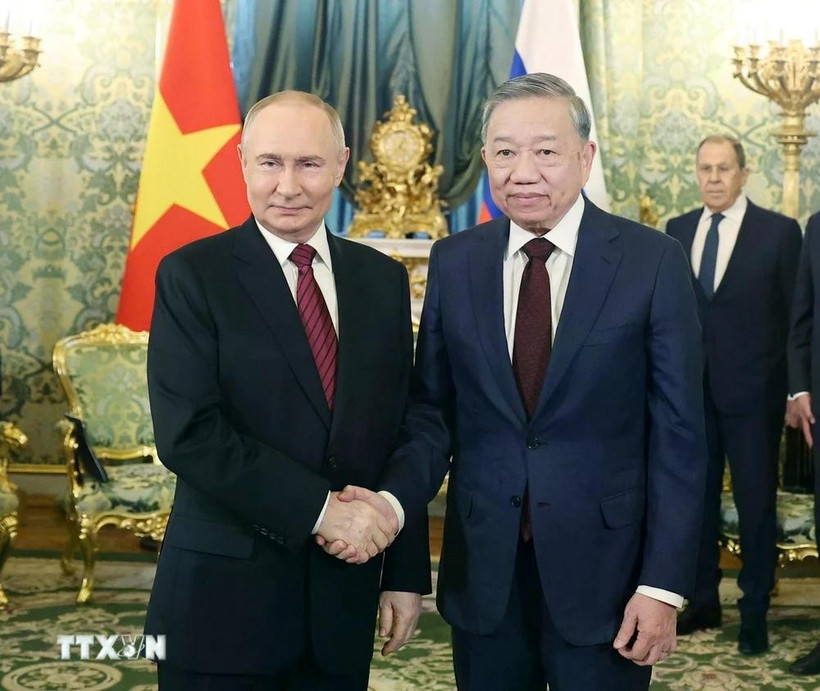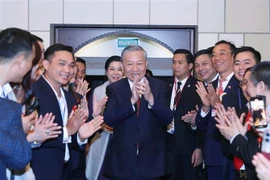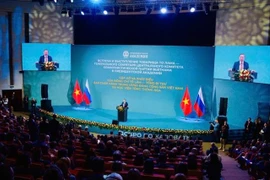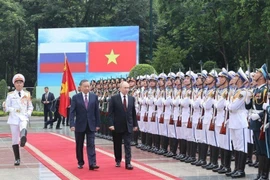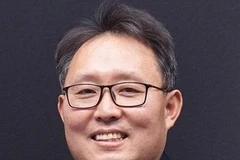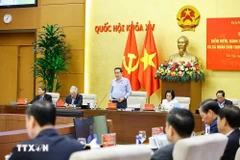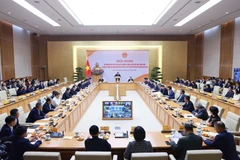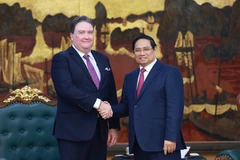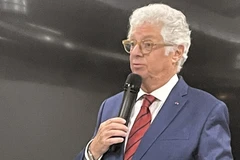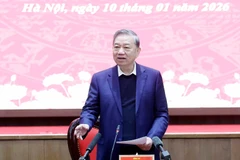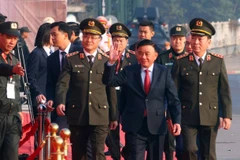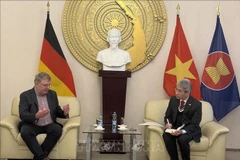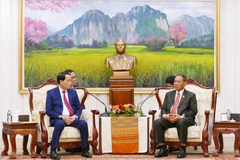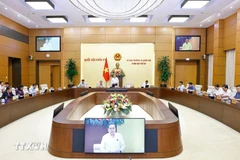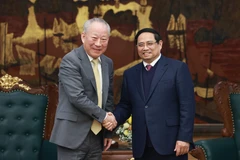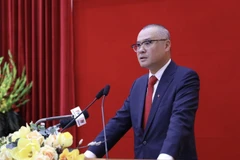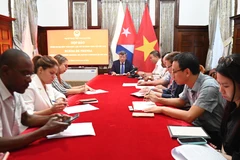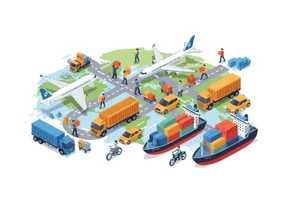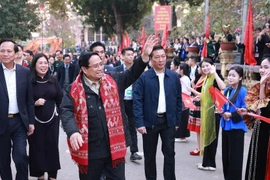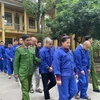Moscow (VNA) – Based on the outcomes of the official visit to Russia by General Secretary of the Communist Party of Vietnam (CPV) Central Committee To Lam from May 8 -11, the two countries have issued a joint statement outlining major directions for the bilateral comprehensive strategic partnership in a new period of cooperation.
The joint statement recognised the achievements Vietnam and Russia have attained over the course of 75 years of diplomatic relations across various fields, particularly in political dialogue, cooperation in defence-security, economy-trade, energy-oil-gas, education-training, and science-technology, people-to-people exchanges, as well as effective coordination and mutual support at international organisations and multilateral forums.
The document noted that these achievements provide a solid foundation and driving force for both sides to further consolidate, expand, and deepen their comprehensive strategic partnership in a substantive and effective manner, making it a model for cooperation in the new era.
On that basis, both sides expressed their determination to fully tap into the potential, advantages, and available opportunities for bilateral cooperation, preserve and strengthen their traditional friendship, and elevate the Vietnam-Russia comprehensive strategic partnership to a new level in terms of quality.
The two sides stressed the need to continue to strengthen regular and substantive high-level political dialogue, as well as to pay attention to improving the effectiveness of existing cooperation mechanisms, particularly their intergovernmental committee on economy-trade and sci-tech cooperation, defence strategy dialogue, strategic dialogue, while establishing new dialogue mechanisms, promptly handling difficulties in bilateral cooperation.
They wished to expand relations between political parties and leaders of legislative bodies; and to continue to coordinate actions at international and regional inter-parliamentary forums.
The two sides affirmed that defence-security cooperation continues to be an important pillar. Joint work in this field is not aimed against a third country and is completely in line with the principles and regulations of international law, contributing to ensuring security and sustainable development in the Asia-Pacific and the world. The pillar covers bilateral cooperation in international information security, biosafety promotion, mutual legal assistance in criminal matters involving information and communications technology, and responses to emergencies.
The two sides also stressed the need to make the most of potentials and opportunities to promote economic and trade cooperation, first of all in trade, investment, finance and credit, in accordance with international law and the laws of the two countries, ensuring a balanced trade and diversifying non-competing export items in each other’s markets. They support the organisation of negotiations between the Eurasian Economic Union (EAEU) and Vietnam on issues of increasing exports, as well as removing technical barriers in bilateral trade.
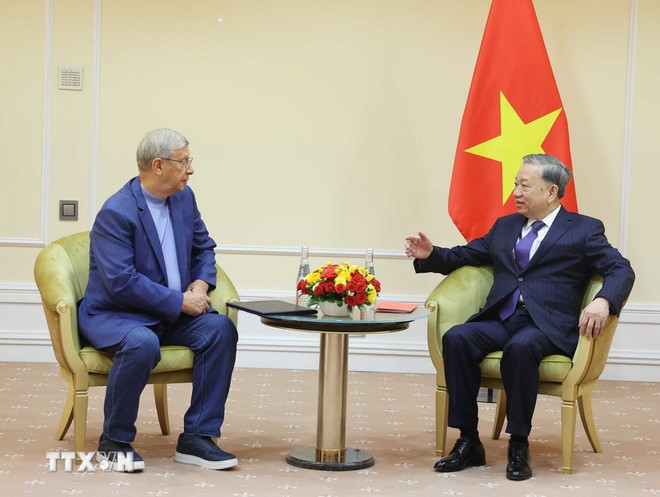
The joint statement highlighted the need to expand and diversify investment areas from Vietnam into Russia and from Russia into Vietnam; both are ready to facilitate and support Vietnamese and Russian businesses in promoting direct cooperation and implementing projects in fields such as mineral exploitation and processing, industry, agriculture, machinery manufacturing and energy, science and technology, digital transformation, and information technology.
The two sides agreed to strengthen collaboration in the energy and oil - gas industries, including Russia’s supply and processing of crude oil and liquefied gas for Vietnam. Both sides are willing to explore the possibility of constructing new power plants and modernising existing factories. The leaders of the two countries support the creation of favorable conditions for the expansion of operations of Vietnamese oil and gas enterprises in Russia and Russian oil and gas enterprises on the continental shelf of Vietnam, in accordance with the laws of Vietnam, Russia and international law, including the 1982 United Nations Convention on the Law of the Sea (UNCLOS).
They also stressed the need to promote cooperation in the development of renewable and clean energy. The two sides agreed to promptly negotiate and sign intergovernmental agreements on the construction of nuclear power plants in Vietnam, ensuring the application of advanced technology and strict compliance with regulations on nuclear and radiation safety serving socio-economic development.
Vietnam and Russia also agreed to strengthen close and effective cooperation in the fields of mining industry, transport, shipbuilding and machinery manufacturing, railway modernisation, and the expansion of transport corridors between the two countries to boost trade and investment.
The two sides affirmed their shared interest in strengthening cooperation in science and technology, education and training, and the development of high-quality human resources across sectors, to best serve the development process. Both agreed to designate 2026 as the year of scientific and educational cooperation.
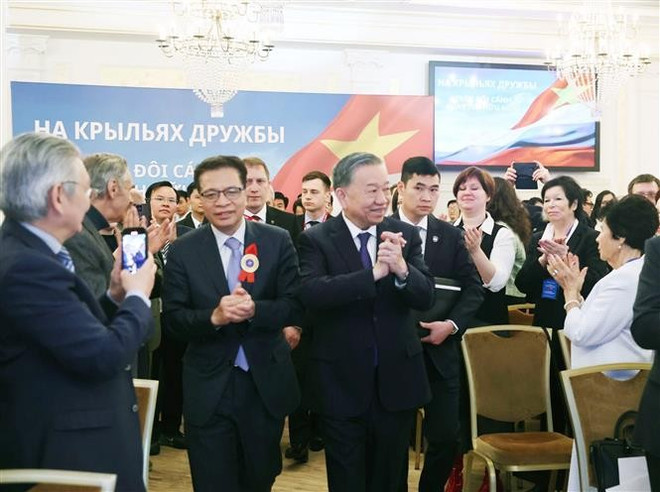
They also affirmed their readiness to support expanded coordination aimed at advancing the proactive agenda of the Vietnam–Russia comprehensive strategic partnership in the global information space, while encouraging the expansion of cooperation between their ministries, sectors, and localities. They supported greater people-to-people exchanges and growing tourism cooperation by increasing the number of regular and charter direct flights between the two countries, as well as simplifying travel procedures for their citizens.
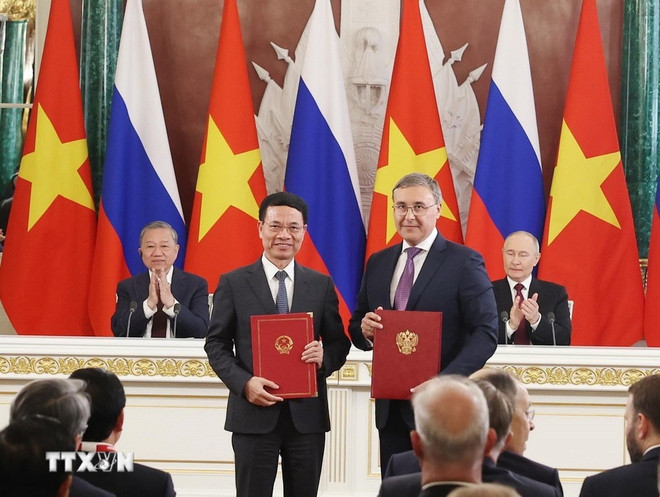
The Vietnamese side expressed its readiness to promote cooperation in the field of healthcare, including the training of medical personnel and scientific research in the medical sector, as well as to discuss the recognition of pharmaceutical certificates issued by Russia and the member states of the EAEU, in accordance with Vietnamese law and international treaties to which Vietnam is a party.
Both sides affirmed their willingness to continue discussions on migration issues and to facilitate favourable conditions for Vietnamese citizens living, working, and studying in Russia, as well as for Russian citizens in Vietnam.
Regarding major orientations for cooperation on the international arena, both sides were committed to supporting a fair and sustainable multipolar world order, while pursuing international cooperation on the basis of mutual benefit, fairness and respect.
They affirmed that every country has the right to determine its own development model and political, economic, and social institutions in accordance with national conditions and the will of its people.
Vietnam and Russia expressed strong support for building a security architecture on the Eurasian continent based on the principles of equality and indivisibility, ensuring peace, stability, and development for all countries on the continent.
The two nations vowed to continue close coordination at the United Nations and other multilateral organisations, stay ready to step up the international community’s efforts in coping with traditional and non-traditional security challenges. This includes cooperation in information and communications technology (ICT) security and coping with emerging risks in artificial intelligence (AI) as part of broader ICT security concerns, terrorism and terrorist financing.
They also reiterated their support for global efforts on arms control, disarmament, and the non-proliferation of weapons of mass destruction, striving for a world free of such weaponry.
The two sides affirmed dedication to addressing climate change, upholding the goals, principles, and core elements of the 1992 United Nations Framework Convention on Climate Change (UNFCCC) and the 2015 Paris Agreement.
Ongoing cooperation in protecting and promoting human rights based on equality, mutual respect, the UN Charter, international law, and each country's national laws were also highlighted.
Stressing regional cooperation, they agreed on the need to bolster joint efforts in Asia–Pacific to build an inclusive, open, and transparent regional security framework.
The two nations reaffirmed the universality and integrity of the 1982 United Nations Convention on the Law of the Sea (UNCLOS) as the legal framework governing all activities at seas and oceans. They underscored the need to preserve the convention’s integrity and its central role in fostering cooperation at international regional and national levels.
The two sides agreed to coordinate to ensure security, safety, freedom of navigation, aviation and trade; support restraint, not use force or threat to use force and resolve disputes by peaceful means in accordance with the principles of the United Nations Charter and international law, including the 1982 UNCLOS.
The Russian side supports the full and effective implementation of the 2002 Declaration on the Conduct of Parties in the East Sea (DOC) and welcomes efforts to contribute to creating a favourable environment for the negotiation process of an effective, substantive Code of Conduct in the East Sea (COC) in accordance with international law, including the 1982 UNCLOS.
Russia reiterated its support for ASEAN’s central role in the regional architecture of the Asia–Pacific and upheld the values and principles of the Treaty of Amity and Cooperation in Southeast Asia (TAC) signed on February 24, 1976.
The two sides pledged to deepen the ASEAN–Russia Strategic Partnership, promoting comprehensive, practical, and mutually beneficial cooperation in ICT, counter-terrorism, fight against transnational crime, sci-tech, education-training, and human resource development.
They supported stronger regional economic integration and inter-regional connectivity initiatives, including the Greater Eurasian Partnership project, and exploring the potential for economic cooperation between ASEAN and the Eurasian Economic Union (EAEU), and furthering coordination between ASEAN and the Shanghai Cooperation Organisation (SCO).
The two sides plan to step up cooperation within the Asia-Pacific Economic Cooperation (APEC) forum and various regional inter-parliamentary mechanisms.
In conclusion, the two side affirmed that the official visit to Russia by General Secretary To Lam and his attendance at the 80th anniversary of Victory in the Great Patriotic War marked a significant milestone and a new historical chapter in the enduring relationship between Vietnam and Russia./.
